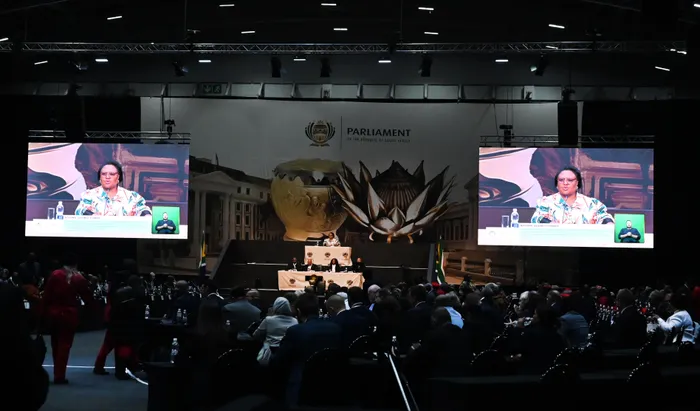National Assembly passes Appropriation Bill amid opposition objections

The Appropriation Bill easily mustered majority with 262 votes against 90 votes.
Image: Ayanda Ndamane / Independent Newspapers
The National Assembly on Wednesday passed several departmental votes despite objections from the opposition parties during a marathon session at the Cape Town International Conference Centre.
This was after the first reading of the Appropriation Bill was passed, paving the way for the approval of the full schedule of votes for 42 departmental and entities and the second reading of the Bill.
The Bill easily mustered a majority with 262 when the ANC, the DA, IFP, Patriotic Alliance, Freedom Front Plus, ActionSA, UDM, Al-Jama-ah, Build One South Africa, Rise Mzansi, GOOD, and PAC voted in favour.
The MK Party, EFF, ATM, National Coloured Congress, and United African Transformation voted against, with a combined 90 votes.
The Presidency was the first budget to be voted for, followed by Parliament, and then the other departments and entities.
As voting continued, individual departmental votes were each passed despite the EFF and MK Party consistently asking for the division of the House.
Speaking during the debate, Deputy Minister for Finance David Masondo called on the parties to pass the Budget to allow the national government to spend R1.23 trillion to deliver services to protect the vulnerable and invest in the country’s shared future.
Masondo warned that the absence of the Appropriation Bill will mean that the government may only spend 45% of the previous year's Budget until the end of July, and thereafter 10% of the previous Budget.
“Our estimation overall by October is that the government will be without authority when we reach 100% of last year’s appropriation,” he said.
He also said failure to pass the Budget would delay critical priorities of the government.
“We should not prolong or object to the passing of this Bill. It is ultimately the most vulnerable members of society who depend on grants, public schools, and clinics who will suffer the most due to our inactions,” Masondo said.
Build One South Africa and Standing Committee on Appropriations Chairperson Mmusi Maimane said the Budget was passed in severely constrained economic conditions.
“Our inherent problem is a problem of growth. As our economy is not growing, it means we have fewer resources to be able to redistribute to our citizens,” Maimane said.
He called for improvements in the Budget process to give effect to the timelines of the Money Bill Act.
“I want to urge going into the next cycle to ensure we establish our priorities that we are clear with economic reform, we budget accordingly, and ensure the Budget process is smoother and people of South Africa can experience fullness of participation in the Appropriation Bill,” Maimane said.
MK Party MP Sanele Mwali said it was disheartening that the country fell apart and the government prescribes the same economic, fiscal, and monetary policy, which failed to bring change and impoverished millions of citizens.
“Economic stagnation and high unemployment with obsession with debt reduction at the expense of investment and growth, and stimulate new economic activity,” Mwali said.
DA MP Kingley’s Hope Wakelin spoke against the R700m budgeted for the upcoming National Dialogue, saying the money could be used for tangible projects such as RDP houses, a job-seekers’ grant, and free basic electricity for the indigent.
“The people do not want to see R700 million wasted on another expensive dialogue,” he said.
He also said spending reviews should be implemented, an exercise that should look beyond reworking the Budget but eliminate duplications, and stop underperforming programmes and political vanity projects.
“These reviews should form part of the 2026 Budget planning,” he said.
EFF MP Omphile Maotwe rejected the Appropriation Bill, saying some members of “the gang unit” were happy to be in government to enjoy the gravy train and were not caring about the country’s future.
She accused some in the Government of National Unity who previously opposed the same Budget every year.
IFP chief whip Nhanhla Hadebe said they were concerned that the allocations did to go far enough to address challenges facing the people.
“While we commend the National Treasury to contain expenditure and limit debt service cost, fiscal consolidation must not come at the cost of service delivery,” Hadebe said.
Rise Mzansi MP Songezo Zibi observed that the Budget was not perfect and that South Africans wanted the government and Parliament to work on the available fiscal envelope.
Zibi said the executive and Parliament should begin to make choices and prioritise programmes that were more important than others.
“Programmes that support economic growth and employment, safety, health, and education in modern skills are obviously a priority, but even those must be thoroughly examined for effectiveness,” he said, adding that programmes that can't produce evidence of sustainable impact must be reviewed and changed or stopped altogether.
The vote on the departments' voting was continuing in the evening after 7pm.
mayibongwe.maqhina@inl.co.za
Related Topics: